How are food supply networks coping with coronavirus?
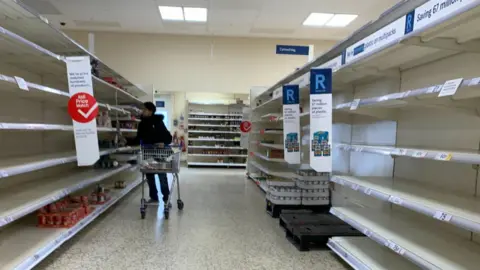 NurPhoto
NurPhotoContinuing pictures of empty shelves at UK supermarkets have sparked ongoing worries about food shortages.
The supermarkets are confident that they can cope, not least because there is a limit to how much people can sensibly stockpile. So they believe that shopping patterns should return to normal eventually.
But the coronavirus pandemic has awakened wider fears about the security and strength of the hugely complicated supply chains, or logistics systems, that modern societies depend on.
There is an old military saying that while "amateurs talk about tactics, professional soldiers study logistics". Meanwhile, the Chinese military theorist Sun Tzu wrote that “the line between disorder and order lies in logistics”.
To test that idea, you only have to look in your kitchen cupboard or fridge. Almost certainly nearly everything in there came from a shop that was stocked by a lorry or van. And much of the food originated from a long way away.
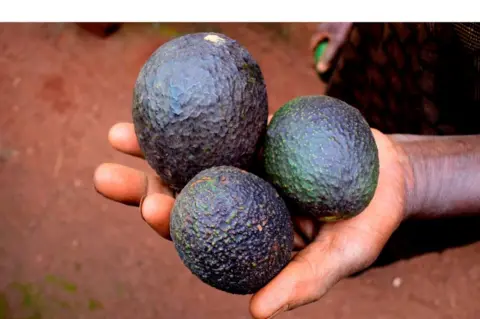
Half of the food consumed in the UK comes from overseas, official figures show, with 30% coming from the European Union. Some basics like wheat to make flour for bread, or lamb chops, may well have come from the other side of the world.
Not only that, but the introduction of “just in time” manufacturing in recent years means that many companies don’t store the components necessary to keep their factories running. They are dependent on the parts arriving “just in time” from their suppliers, often from thousands of miles away.
While that has led to the closure of nearly every car plant in the UK, that same system has also been adopted by the large supermarket chains. As Tim Lang, professor of food policy at London's City University, explains, that makes the system vulnerable.
"It is like a web of stretched rubber bands,” he says, “if one breaks then it knocks on through the system."
The whole point of just in time logistics is to get rid of the cost of warehousing, and so there are not many reserves of food in the UK.
So, keeping logistics working is essential to putting food on the table, and keeping the country’s economy working. But how robust is it, and what plans are there to keep it working when more and more people become ill, or are isolated, by the virus?
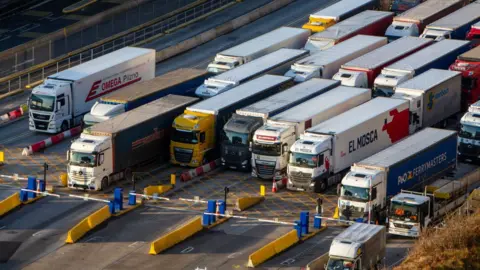 Andrew Aitchison
Andrew AitchisonThe good news is that there are plans in place to keep essential supplies flowing. For example, the Freight Transport Association is working hard to ensure that, in the face of a shortage of garage mechanics, trucks still get serviced as and when required.
Meanwhile, the government is treating logistics workers in the same way as the emergency services or NHS staff. So they should have better access to coronavirus testing, and be able to keep their children in school, so that they are free to go to work.
There is also spare capacity that is now free to be used. For instance, the closure of car plants across the country means that their fleets of supply trucks will not be needed for the duration. And the same goes for suppliers to all the restaurants, bars and cafes which have been shut down.

Global Trade

Such suppliers already have the facilities and equipment to deliver food to supermarkets - refrigerated vans, food handling systems, warehousing that can be quickly repurposed for delivery to stores, or even to add to online food delivery capacity.
There is also a lot of retail capacity that is not now being used, and so can be diverted to food, medicines and hospital supplies. John Lewis, for example, has moved staff from its closed department stores to its Waitrose supermarkets. Meanwhile, Amazon is taking on 100,000 extra workers.
The logistics industry seems confident that it can keep the shops supplied. Christopher Smelling, the Freight Transport Association's head of policy, says that the continuing empty shelves is a result of panic buying, and not a lack of supply.
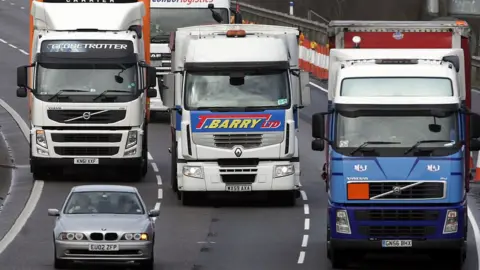 Getty Images
Getty ImagesHe adds that the "massive fall" in the number of cars on the road is helping matters because it "frees up logistics" - easier and speedier journeys mean more deliveries can be made every day by every driver.
However, not all the extra buying in supermarkets is for stockpiling or panic buying - in London a quarter of all meals are normally eaten outside the home. Closing all cafes, bars and restaurants has had the obvious consequence of increasing demand for food from shops, and that will continue.
The UK is also vulnerable because it does not operate in a vacuum, it imports almost half of its food, and therefore the smooth working of other countries supply chains is vital to our own.
Dr Peter Alexander, a global food security expert at Edinburgh University, believes the system will cope so long as staffing levels can be maintained, and if imports are not disrupted for a long period of time.
He believes, however, that this virus is a particular challenge for a free-market, just in time-based logistics network. Such a system, he says, “is more resilient to shocks in one place, or to one commodity”, as it can change suppliers or products quickly, but “a systemic shock is its weak point”. There is little slack in the system or reserves to fall back on.
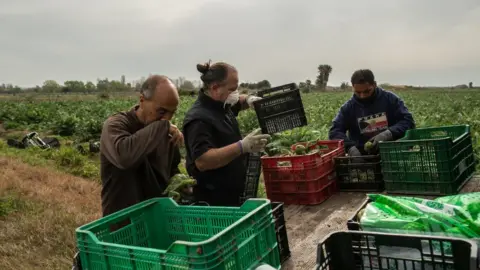 Getty Images
Getty ImagesAs borders across Europe have been sealed, exceptions have been made for the trade in goods. But the UK is dependent to a large degree on that continuing, and on Spanish farmers, French lorry drivers and Dutch dock workers turning up to work.
At the moment this system still seems to be working. Goods are still arriving from Italy for instance, even though the country is in a shutdown. But it would only take one country to start banning the export of food for the whole system to be at risk, as others retaliate to secure their own supplies.
If coronavirus has shown us anything, it is how complicated and delicate supply chains have become. After this crisis has passed, there is bound to be immense pressure on companies and governments to strengthen and simplify them.
